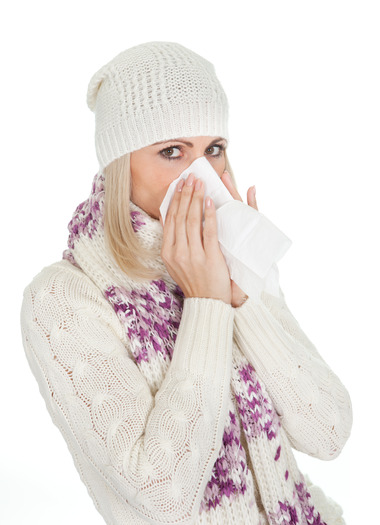Why does Santa have a red nose and red cheeks? Is it because it’s cold in the North Pole or he had too much eggnog? It’s possible that Santa, like so many Americans, is suffering from some kind of allergy. Winter allergies can cause havoc in the holiday plans of many people. But, with a bit of caution and some planning, you can enjoy your Christmas without too much sneezing, coughing and watery eyes.
Christmas tree allergy
You brought the most magnificent Christmas tree home, only to find one of your kids is now sneezing and breaking out in a rash. Conifers are frequently bearers of mold spores and pollen, common allergy triggers in people who are sensitive to them. If you know that one of your family members is allergic to mold, you might have to switch to an artificial tree. Just make sure it is well dusted, or the dust can cause its own allergic reaction.
Christmas ornaments
Many of us have Christmas ornaments that we inherited from our parents or even grandparents.

They are the family heirloom, carefully guarded and enjoyed every year. But, spending a year in a box in the attic or basement can mean that, along with your ornaments, you are bringing mold and dust particles, causing instant allergic reaction to allergy sufferers. Make sure that ornaments are carefully dusted before being placed on the tree. Invest in a sealed box to store the ornaments, to keep them free from dust until the next Christmas season. Avoid ornaments made of cloth, or ornaments which cannot be cleaned.
Mold and dust
During the wintertime, we spend more time indoors; windows are seldom opened due to cold, so the concentration of dust and mold spores in the home is higher. This is especially the case during the holidays, when we dig out our party clothes, extra blankets for guests or those handy fold-out beds. Mold spores like high humidity and are usually present in the basement. Get rid of the humidity by installing a dehumidifier which lowers the humidity by up to 50 percent. To eliminate as much dust as possible, consider installing a HEPA filter into your heating system.
Food allergies
Christmas holidays are usually accompanied by abundant amounts of food. You may be eating a dish prepared by your aunt, friend or a neighbor. In many cases, we are unaware of the ingredients used in preparation of these foods, which can lead to an allergic reaction if we aren’t careful, especially with our children. Most parents know what their kids are allergic to. Common allergies in children include peanuts, eggs or milk, and in adults peanuts, walnuts, eggs and shellfish. Ask your guests about the food they brought for your Christmas party. Make sure that dishes which contain allergens are separated.
Even the best precautions might not be enough. If in the middle of your Christmas party you see one of your family members or guests suddenly having difficulty breathing, having low blood pressure or a skin rash, you could be dealing with an allergic reaction. If the reaction is severe, use your Epi pen and call the emergency immediately. For mild reaction, use antihistamines and decongestants to relieve the symptoms.
Pet allergy
Some of your guests might be allergic to your dog or cat. Some of them might bring their pets, and your family member might be allergic to them. You can reduce the allergy suffering by banning pets from bedrooms and removing all carpets and rugs. Send kids and pets out of the house to play. Everyone should wash their hands with soap after petting the dog or cat. If your child has asthma, you may have to put your foot down and ask your guests to leave their pets at home.
Allergies should be treated seriously. The most severe allergic reaction, anaphylactic shock, can be deadly if not treated urgently. Allergies sometimes appear suddenly, in people who never suffered from them. If you suspect that someone is having severe allergic reaction, do not hesitate – call the emergency, even it means the end of your carefully planned Christmas party.
Sleep – The Healthiest Pain Killer

Santa gets all sorts of funny wishes, but one of the strangest is the one that comes from about six percent of Americans: they wish for more sleep. The latest year-end Holiday Slumber Index, a traditional survey conducted by the sleepbetter.org, examined how the holiday season affects American adults’ sleep patterns. They came up with some interesting results.
Sleep-deprived holiday-makers
Most interviewed people admitted that they do not get enough sleep during the holidays.
The most affected are the parents. About 44 percents moms and dads said that the reason for the lack of sleep is their worry that they will not be able to fulfill their kids’ wishes and expectations. They simply cannot afford the cost the holidays entail. But, parents are not the only ones suffering. People without kids said that they cannot sleep during holidays out of pure stress, caused by the traditional holiday chaos and frenzy.
Even people who enjoy holidays and find the season joyful and fun said that they do not get enough sleep. There is simply too much to do: trees to decorate, stockings to fill, cakes to bake, gifts to wrap, Christmas cards to write…
We need sleep
In our efforts to fill our lives with all the things we want to do, we often sacrifice sleep, without realizing how serious lack of sleep can be. Doctors and sleep experts warn that we need at least eight hours of good, uninterrupted sleep for optimal health.
There are many activities that happen within our body and our brain while we are asleep. The most obvious is that during sleep we rest and regain energy. But, many other actions happen during sleep, and only during sleep, such as tissue repair, muscle growth, protein synthesis, and the release of growth hormone. Sleep is linked to changes in the brain’s organization and structure. During sleep, our brain sorts our daily events and forms long-term memories. Lack of sleep affects our ability to learn and retain what we have learned.
Sleep and pain
While scientists admit that they still have a lot to learn about the effect of sleep to our health, the latest research found a link between the amount of sleep we get and our ability to sustain pain.
A group of scientists worked with a small group of 18 adults. Half of them spent four days sleeping about 10 hours, and the other half were allowed to sleep their usual time. On average, it was about 7 hours. After a short time, researchers found that the participants who slept longer had 25 percent less sensitivity to pain. This is the first study of its kind and the researchers are cautious to draw conclusions about the potential their results will have on pain control and management. Nevertheless, what they have learned opens avenues for more research on using sleep to prepare people for surgery and treating all kinds of chronic pain, including chronic pain syndrome.
If you are one of those lucky people who spend eight or nine hours every night sleeping the sleep of the innocent, you know the feeling of waking up full of energy, alert and ready to face the day. If you prefer to spend your nights playing computer games or watching TV, you might be risking your long-term health, short-term energy level and ability to learn. Stop burning the candle at both ends and get some sleep!


